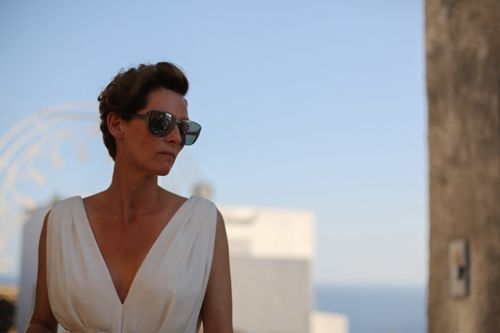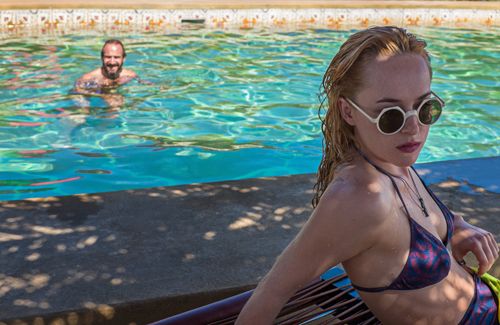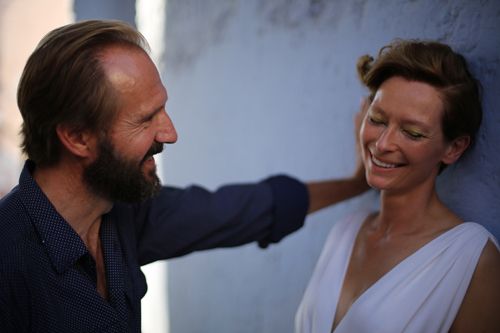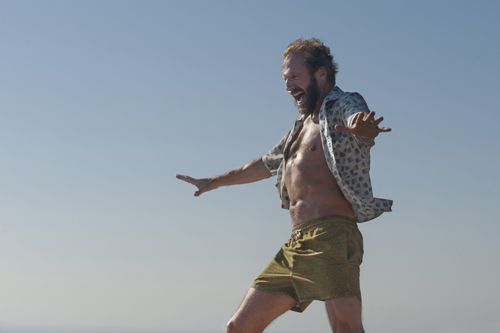It is not a coincidence that A Bigger Splash takes place on a volcanic island: the film is comprised of dormant passions, waiting to erupt.
David Kajganich's adaptation of the sensual 1969 thriller La Piscine follows rock star Marianne (Tilda Swinton) and her recovering alcoholic boyfriend Paul (Matthias Schoenaerts) as their blissful holiday is soured by the unwelcome, sexually provocative intrusion of her ex Harry (Ralph Fiennes) and his new-found daughter Penelope (Dakota Johnson).
As its foursome flirt and fight, the film throbs with intense, volatile emotion: it is also not a coincidence that in person its director Luca Guadagnino is similarly animated.
One of the central ideas of A Bigger Splash is the conflict between two ways of living: a traditional hedonistic rock and roll lifestyle, which is embodied by Harry, and a contemporary sort of clean living which Paul and Marianne are attempting to pursue. Why were you interested in exploring that divide? You put me in a place in which I feel uncomfortable because you're asking me to give my own explanation of the film, which I am not very eager to do generally. I think the audience should make a judgement by themselves. I would say that the idea of nostalgia and wanting to get back what you've lost is something that I always think about, and in these characters you have that clash, a kind of battle between wills. It's a very universal, powerful dynamic.

When you have characters who have opposing philosophies, as a director do you take a side or is it important to be sensitive to both points of view? A director should never judge their characters. It's a disgrace if you do that. You should be as open as possible, as broad as possible and you should be able to invest in every act the characters make without judging them ever. If you judge your characters you're putting yourself on top of them and it's a disaster.
The characters are all driven by desire for each other--We all are. Aren't you?

Yes, certainly. I thought it was notable however that there's this struggle where each character wants someone else sexually, and is motivated by this. But this is exactly what we are bound to, so I wanted to make a movie about something that people can absolutely recognise in their own lives, even if they're not rock stars.
Due to an operation on her throat, Marianne is almost entirely silent and has to express herself in other ways. Was that a challenge to depict? Not when you have a great performer like Tilda Swinton. In general, no, because I think that people behave and communicate not just with words, but with the position they take in physical space. You are communicating much more through the position of your feet right now than by anything you're saying, in my opinion. A director is someone who has to be very attentive of behaviour and try to capture everything that comes as communication, whether in words or physically.

The original film La Piscine was set on the French Riviera which is warm but cool, while A Bigger Splash takes place on the island of Pantelleria, where there's the intense Sirocco wind. Was shifting the location a key decision for you? It started everything. When I said I'm going to do this movie based on La Piscine, I had to move the action to an island. I needed the movie to be set adrift and for the environment to challenge the characters. I didn't need a luxurious backdrop. That doesn't interest me, I hate it.
What would you say is the biggest difference between the original version and yours? I haven't seen that movie. I saw it only when I was 16, so I don't know what to say.

Do you think it's a better approach to adapt a film from a distant memory rather than looking at it closely? I was just working from the concept that there were two couples: one father and daughter and one new couple. That was my memory of what was in the movie. The writer may have seen it again but I didn't. I remember there was a moment in La Piscine in which Alain Delon slashes Romy Schneider with a branch, but we don't have any slashing in this movie.
You also altered the title to A Bigger Splash, which is the name of a David Hockney painting that depicts a splash of water as someone dives into a swimming pool. Why did you change the name from a location to the consequence of an action? The pool isn't the important point, the point is the clash. I'd much rather focus on the action rather than the concept of the pool itself. I also wanted, in my megalomania, to buy that painting when I was young. Somehow I feel I now possess it in a way because it's the title of my movie.
A Bigger Splash is released on 12th February.

